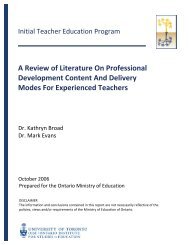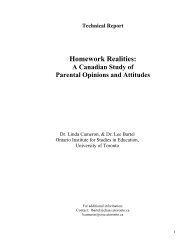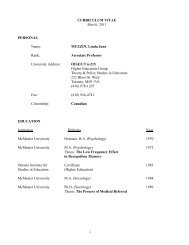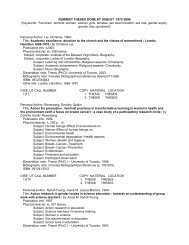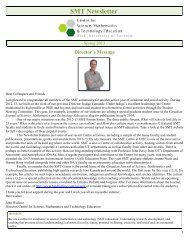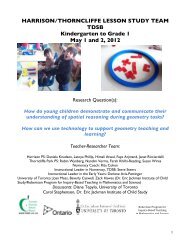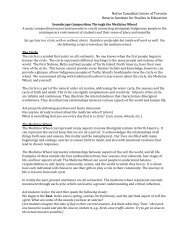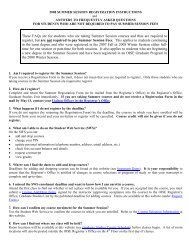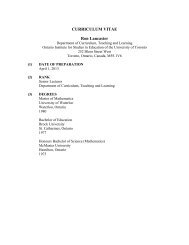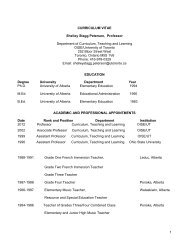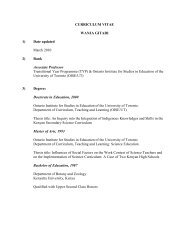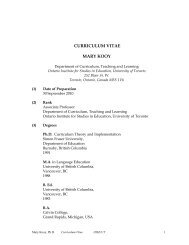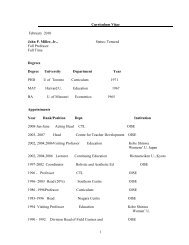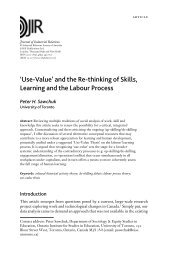The Ontario Curriculum, Grades 9-12 - Ministère de l'éducation ...
The Ontario Curriculum, Grades 9-12 - Ministère de l'éducation ...
The Ontario Curriculum, Grades 9-12 - Ministère de l'éducation ...
Create successful ePaper yourself
Turn your PDF publications into a flip-book with our unique Google optimized e-Paper software.
Sample issue: <strong>The</strong> agricultural sector holds great economic potential as <strong>de</strong>mand increases<br />
for products such as biofuels, biochemicals, and biopharmaceuticals. Bioresources could<br />
also support our efforts to produce renewable energy, improve health, and minimize<br />
environmental impact. However, critics are concerned about the impact of bioresources<br />
on the availability of food crops and the price of food.<br />
Sample questions: In what ways does the local-food movement contribute to community<br />
<strong>de</strong>velopment? How does the re-introduction of native plant species along river banks help<br />
to prevent land erosion? What plant species are consi<strong>de</strong>red important in sustaining<br />
Canada’s growth in the agricultural sector? How might the increasing <strong>de</strong>mand for strawbale<br />
housing materials support Canada’s agricultural sector and increase the sustainability<br />
of other natural resources?<br />
F1.2 evaluate, on the basis of research, ways in which different societies or cultures have used<br />
plants to sustain human populations while supporting environmental sustainability (e.g.,<br />
sustainable agricultural practices in <strong>de</strong>veloping countries such as crop rotation and seed<br />
saving; traditional Aboriginal corn production practices) [IP, PR, AI, C]<br />
Sample issue: Aboriginal peoples living near Canada’s boreal forest rely on forest plants<br />
for food and medicine. Plants are harvested by traditional methods to maintain natural<br />
habitats and local biodiversity. However, these traditional practices are threatened as<br />
more areas are subject to <strong>de</strong>velopment and commercial resource exploitation.<br />
Sample questions: How are strategies for the conservation and sustainable use of<br />
medicinal plants being used by small communities and traditional healers in some<br />
<strong>de</strong>veloping countries? What effect does the re-establishment of wetland plants in<br />
agricultural settings have on the natural balance of the ecosystem? How are plants being<br />
used to clean wastewater from fish farms so that the water can go back into local<br />
streams?<br />
F3. Un<strong>de</strong>rstanding Basic Concepts<br />
F3.5 explain the process of ecological succession, including the role of plants in maintaining<br />
biodiversity and the survival of organisms after a disturbance to an ecosystem<br />
Biology, Gra<strong>de</strong> 11, College Preparation (SBI3C)<br />
A. Scientific Investigation Skills and Career Exploration<br />
A2. Career Exploration<br />
A2.1 i<strong>de</strong>ntify and <strong>de</strong>scribe a variety of careers related to the fields of science un<strong>de</strong>r study (e.g.,<br />
food science technologist, medical laboratory technologist, <strong>de</strong>ntal hygienist, outpost<br />
clinic/primary care nurse, respiratory therapist, veterinary technician, water or wastewater<br />
technician) and the education and training necessary for these careers<br />
B. Cellular Biology<br />
B1. Relating Science to Technology, Society, and the Environment<br />
B1. evaluate the impact of environmental factors and medical technologies on certain cellular<br />
processes that occur in the human body<br />
Science 113



